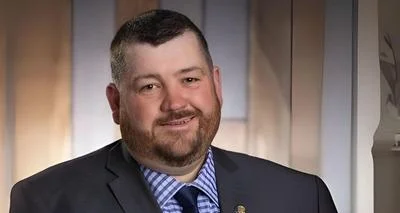Former Republican Ohio Congressman Jim Renacci, who is running against Gov. Mike DeWine in May's gubernatorial primaries, attends a Make America Great Again rally. | Douglas Coulter
Former Republican Ohio Congressman Jim Renacci, who is running against Gov. Mike DeWine in May's gubernatorial primaries, attends a Make America Great Again rally. | Douglas Coulter
The former Republican congressman challenging Ohio Gov. Mike DeWine in May's GOP gubernatorial primaries called the governor out on alleged tax cuts he mentioned during Wednesday’s State of the State address.
"The governor's tax cut claim just (doesn’t) add up, particularly with the sweet deal Intel got from the state to build on 1,000 acres in New Albany," DeWine's gubernatorial challenger, Jim Renacci said in a video response on Facebook.
"The governor talked about the accomplishment of Intel bringing jobs to Ohio," Renacci said. "The problem with that is he forgot to tell you that it's going to cost the state $2.5 billion. Those dollars could be spent in so many other places."
Renacci also mentioned part of Intel's deal with the state that DeWine "neglected to tell you" during the state of the state address, suspension of Ohio's Commercial Activity Tax (CAT).
The CAT applies to all businesses with annual taxable gross receipts of at least $150,000, according to the Ohio Department of Taxation. The Department describes the tax as "an annual tax imposed on the privilege of doing business in Ohio."
"The CAT tax alone was estimated to be more than all the other CAT taxes in totality with all the other companies," Renacci said. "So, if you're a business in Ohio, you've got to be looking and saying 'Now, wait a minute - you just took my tax money, you spent it and gave it to Intel, and now you're going to give them a break that you're not going to give me.' Look, we do need changes in our tax system. And Governor DeWine saying that he cut taxes just isn't true."
Renacci, 63, is an accountant and businessman who represented Ohio's 16th Congressional District from 2011 to 2019.
DeWine, 75, was chosen by then term-limited Republican Ohio Gov. John Kasich to succeed him in 2019. DeWine is one of the longest-serving elected officials in Ohio's history, according to West Hamilton News (WHN), having spent more than 41 years in elected office, including time in the Ohio and U.S. senates, Ohio attorney general and the U.S. House of Representatives.
DeWine and Renacci are expected to face off in the May 3 GOP gubernatorial primary. The winner will appear on the ballot for the Nov. 8 General Election, WHN reported.
DeWine delivered his 2022 State of the State address Wednesday and highlighted tax cuts of more than $3.6 billion, the lowest in the state in four decades, which left "more money for businesses to re-invest in our economy and more money in the pockets of our fellow Ohioans," according to a transcript of the speech published by ABC 6.
"And to think we have done all these many things - all of them - during a once-in-a-hundred-years pandemic," DeWine said. "Though we have had many shared successes, the past couple of years certainly been difficult for Ohioans, and we continue to pray for those who died from COVID, and we pray for their families."
Not everyone is impressed by what DeWine described as Ohio's recent tax-cut history. WalletHub reported March 7 that Ohio ranks as the nation's 43rd tax-friendliest state in the nation and that Ohioans pay almost 22% more in taxes than the average U.S. taxpayer. Renacci referred to WalletHub's report during his response.
The Tax Foundation's State Business Tax Climate Index, released in December 2021, lists Ohio as 41st in the country for individual income tax burden and 40th for business tax burden.
The Investigative Post reported in February that Ohio offered Intel more than $2 billion in incentives to construct microchip manufacturing facilities outside of Columbus.
"The subsidy package for what’s been described as the largest single private-sector company investment in Ohio history reportedly involves $1.2 billion in cash incentives, including a direct cash grant to the company valued at $600 million," the Investigative Post reported.
Ohio has also promised to cover almost $700 million in infrastructure costs for the Intel project and will provide Intel an additional $650 million in tax credits over a 30-year period, according to the report.
"After listening to the governor, he seems to be going down a track of more spending and bigger government - something that Ohio can't afford to do," Renacci said. "Ohio is one of the top ten states in the country for spending"
Over the past year, Ohio increased its budget from $76 billion to $80 billion, Renacci added.
"We already double the size of similar states when it comes to spending, yet what we heard from Governor DeWine is another plan for more spending," he said.






 Alerts Sign-up
Alerts Sign-up